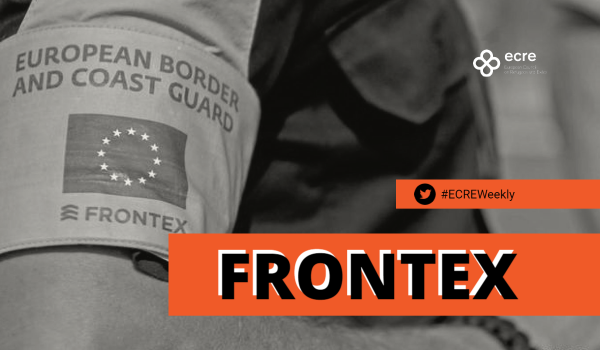MEPs have urged the “sensitive” findings of a year-long European Anti-Fraud Office (OLAF) investigation into the European Border and Coast Guard Agency (Frontex) be disclosed. The agency is stepping up support at the Ukrainian border and has received a greenlight for technical discussions on deployments to Senegal.
An investigation launched in January 2021 after OLAF raided the offices of Frontex Executive Director Fabrice Leggeri and his head of Cabinet was concluded on 15 February. The probe looked into harassment and misconduct allegations, as well as the agency’s involvement in pushback operations. According to an exclusive report by Der Spiegel, Frontex senior management has been involved in cover-ups of illegal acts, including “leaving of migrants adrift in engineless life rafts, a well-documented pushback tactic of the Greek Coast Guard”. The findings are reportedly so “sensitive” that access has been limited to the Frontex Management Board members and selected MEPs – the latter in a closed meeting. On behalf of the Committee on Civil Liberties, Justice and Home Affairs (LIBE committee), MEP Tineke Strik is urging the release of the findings. Strik, who has participated in long-term scrutiny of Frontex, states that the findings: “need to be disclosed to the public, although we understand that some parts need to be anonymized. Frontex is an EU-agency and therefore it is conducting its operations on behalf of the EU. So we all have the right to know whether the organization is functioning properly, and hold them accountable for misconduct if this occurs”. The LIBE Committee demands an answer from the Frontex Management Board within 15 working days. Reportedly the board is itself considering disciplinary action over the findings. The lack of transparency contradicts the European Ombudsman’s earlier demand for the establishment of a transparency framework for EU justice and home affairs agencies in January 2021. More than a year later, Frontex has finally acted on the obligation to create a register of documents. However, as pointed out by Statewatch the agency still keeps a “report detailing findings of great public interest” confidential.
Frontex is the largest EU agency with a budget of 750 million euro in 2022. It has long faced scrutiny including from beyond the European Ombudsman, LIBE’s Frontex Scrutiny Working Group (FSWG), the Frontex Management Board itself, and in two cases against the agency is raised before the Court of Justice of the EU (CJEU). France, which currently holds the presidency of the Council of the European Union, recently proposed a new EU internal borders council for Schengen. Under this proposal, Frontex would spearhead the EU response to “migratory pressure” at the external borders. Frontex head Leggeri recently sparked controversy over the statement: “some talk about ‘refoulement’, but it is not a legal term” while framing pushbacks and border control as a “balance”. In Switzerland a referendum is planned to decide on a proposed increase of funding for Frontex from 24 million CHF in 2021 to 61 million in 2027. While campaigners underline Frontex complicity in suffering at the European borders, the government points to commitments under the Schengen and Dublin cooperation for the non-EU state and points to the consequences of a no vote.
In a communication on “European solidarity with refugees and those fleeing war in Ukraine” from 8 March the European Commission states: “EU agencies are also providing extra manpower and expertise to support Member States. The first group of 49 Frontex staff deployed at EU-Ukraine borders and the border with Moldova is being supplemented by 162 staff being deployed to Romania”. Frontex already on 2 March confirmed the deployment of “150 officers, along with 45 patrol cars and other equipment to Romania’s border with Moldova and Ukraine, 120 of which had arrived by 8 March. The agency further announces that it is looking for ways to “support non-Ukrainian nationals who have fled the country and would like to go back to their countries of origin with return flights”. According to the UN Refugee Agency (UNHCR) roughly 85,000 people were hosted by Romania 11 March: many more have crossed the border in transit elsewhere.
On 14 February, the EU confirmed that Senegal’s interior minister had given the “green light for technical discussions,” potentially leading to the first deployment of armed European border and coastguard forces beyond Europe. At a press conference in the capital of Dakar during a visit to Senegal and Niger leading up to the beginning of talks, Home Affairs Commissioner Ylva Johansson offered surveillance equipment such as drones and vessels, as well as Frontex personnel deployed alongside local forces, to “work together to fight the smugglers”. Frontex has already struck similar agreements with third countries bordering the EU such as Albania in 2019, Montenegro in 2020 and in Serbia in 2021. According to Sebastian Carlotti in an in-depth analysis published for the Sciabaca and Oruka project by ECRE member ASGI, such an agreement should be seen in the context of the broader attempt of outsourcing or externalising European borders. He further notes that a Status Agreement with Senegal, if signed, could lead to active intervention for the patrolling of the so-called Atlantic route, the border posts with Mauritania and the other routes to Algeria and Libya. “Europe is showing once again to be blind, both addressing the effects rather than the root causes of mobility and not taking into the slightest consideration people’s free choices on their own lives”, said Michela Pugliese, Migration and Asylum Researcher at Euro-Med Monitor.
For further information:
- ECRE, Frontex: EU Border Control in Africa Set to Expand, Commission Floats Political Oversight, Switzerland to Vote on Frontex Funding, Belgium Plans Scrutiny Hearing, February 2022
- ECRE, Frontex: MEPs Freeze Part of the Budget of the Agency Under Scrutiny and Facing Legal Action, October 2021
This article appeared in the ECRE Weekly Bulletin. You can subscribe to the Weekly Bulletin here.

